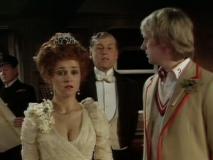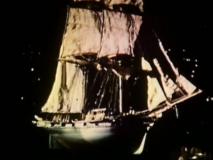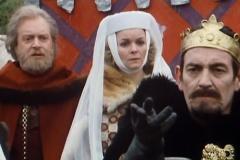An Unearthly Series - The Origins of a TV Legend
Friday, 14 June 2013 - Reported by Marcus

 The twelfth in our series of features telling the story of the creation of Doctor Who, and the people who made it happen.
The twelfth in our series of features telling the story of the creation of Doctor Who, and the people who made it happen.The story so far: With Doctor Who having been initially conceived and formatted by Sydney Newman, Donald Wilson and CE Webber, along with other staff and writers in the BBC's script department, work on actually getting the series made is now under way. Although some scripts are in development, none of the main characters has yet been cast, and by June 1963 the programme does not even have a producer in place . . .
In the early summer of 1963, the day-to-day management of Doctor Who was in the hands of producer-director Rex Tucker. It was never envisaged that Tucker would be the producer of the series in the long term, but it was at the time planned that he would be the chief director on the programme, to helm the first serial and then several others across the proposed 52-week run.
Tucker's temporary position as producer of Doctor Who, in addition to his directorial duties, reflected something of a state of change in the way BBC dramas were being produced at the time. In the 1950s, it was common for a single producer-director to have overall practical and artistic control over a production, and Tucker himself had a great deal of experience in this producer-director role on a number of children's serials and adaptations of classic literature.
By the early 1960s, and in tandem with Newman's arrival as Head of Drama Group at the BBC, the system was changing for drama series and serials. The main regular members of a production team would be the producer and story editor, with directors being appointed on an ad hoc, serial-by-serial or episode-by-episode basis, much like the writers. But despite the knowledge that he would not be the full-time producer of the series, Tucker took full charge of all areas of production for the fledgling Doctor Who in May and early June 1963 – including ideas of casting.
 Tucker was friends with an actor called Hugh David, a 37-year-old Welshman who had recently come to public attention as one of the stars of a Granada Television crime-drama series called Knight Errant Limited. Although David was younger than the "frail old man" envisaged by Newman, Wilson and Webber, at some point by early June 1963 Tucker had offered him the role of the Doctor – quite possibly the first actor ever to be asked to play the part.
Tucker was friends with an actor called Hugh David, a 37-year-old Welshman who had recently come to public attention as one of the stars of a Granada Television crime-drama series called Knight Errant Limited. Although David was younger than the "frail old man" envisaged by Newman, Wilson and Webber, at some point by early June 1963 Tucker had offered him the role of the Doctor – quite possibly the first actor ever to be asked to play the part.David, however, had been uncomfortable with the public recognition that starring as Stephen Drummond in Knight Errant Limited had brought him, and he was reluctant to now become the star of another programme, so turned down Tucker's offer. He eventually decided to wind down his acting career not long after this, and made a move behind the cameras, working as a director. In this capacity, he would go on to direct two Doctor Who stories later in the 1960s, during the Patrick Troughton era – The Highlanders and Fury From the Deep. In later years, David would go on to make the claim that it had been Tucker who came up with the title Doctor Who, although there is no documentary evidence for this, and it is not a claim that Tucker ever made himself.
Despite Tucker's offer to his friend, it is doubtful that David would have ended up playing the Doctor even if he had been keen on the role. Not long after the offer had been made, Doctor Who finally had a full-time producer assigned to take charge of the series, someone who would later state that David would have been too young for the part.
But this producer had not been the first choice for the job.
When Newman was attempting to find a producer for Doctor Who, his first port of call was 26-year-old director Don Taylor, to whom he offered the job at an unknown point, probably in May or June 1963. This offer was something of an olive branch from Newman, as Taylor was a somewhat higher-brow and more classically-cultured figure than the Canadian, and he was horrified by the idea of such an unashamed populist being in charge of the BBC's drama output. In his memoir Days of Vision, published in 1990, Taylor wrote scathingly of Newman, saying that:
To put it brutally, I was deeply offended that the premier position in television drama, at a time when it really was the National Theatre of the Air, had been given to a man whose values were entirely commercial, and who had no more than a layman's knowledge of the English theatrical tradition, let alone the drama of Europe and the wider world.
Taylor was best-known for working on sophisticated single plays for adult viewers, particularly for his work directing the plays of David Mercer. Newman's Doctor Who offer held no interest for him, and he turned the producer's job down flat. Later in 1963 he resigned from the staff of the BBC in despair at the changes being wrought under Newman, particularly the abolition of the old producer-director system, and he would later claim to have been blacklisted from working for the drama department as a freelance director. Speaking to Doctor Who Magazine in 1993, however, Taylor had a more conciliatory attitude towards Newman and his offer:
He had this marvellous idea for a new series, that would be right up my street, really intellectual stuff, and he would like me to take charge of it, launch it, let it be my project. I've often wondered what might have happened if I'd taken him at his word... There, as they say, was a chance missed.
Newman next turned to someone who would perhaps have been rather a better fit for Doctor Who – 43-year-old producer-director Shaun Sutton. Sutton had formed a particular reputation for his work on children's serials in the 1950s, and unlike Taylor he had great respect and admiration for Newman. However, like Taylor, he also turned down Newman's offer to become Doctor Who's first producer. This was because he was keen to move on from children's drama and was interested in tackling more adult fare – he had already worked as a director on episodes of the police drama Z-Cars since that series had begun in 1962.
Sutton did, however, later go on to become involved in the production of Doctor Who. In 1966 he became the Head of Serials in the drama department, in which role he was effectively the show's executive producer. He gave approval for William Hartnell to be replaced, and was involved in the decision to cast Troughton as the Second Doctor. He later succeeded Newman as overall Head of Drama at the BBC, a role he went on to occupy until 1981 – longer than anyone else either before or since.
With both Taylor and Sutton having rejected the chance to take charge of the series, and a full-time producer badly needing to be appointed, Newman's thoughts turned back to his time in commercial television, at ABC. While working at the ITV contractor, he had been impressed by the verve and the vigour of a young production assistant in the drama department named Verity Lambert. With nobody else seeming to want to produce Doctor Who, Newman decided to take a chance and offer her the opportunity to follow him to the BBC and become the producer of the new series.
Born in London in November 1935, Lambert had been educated at Roedean School, near Brighton, and at the Sorbonne in Paris. She entered the television industry in 1956, working as a secretary at Granada Television, before moving to ABC Television a few months later. She was initially the secretary for the company's Head of Drama prior to Newman, Dennis Vance, before moving on to become a production secretary and then a production assistant. It was in this latter capacity that she had worked with Newman on dramas such as Armchair Theatre, and she had displayed the capable, positive attitude that had so impressed him. As he later told Doctor Who Magazine:
I remembered Verity as being bright and, to use the phrase, full of piss and vinegar! She was gutsy and she used to fight and argue with me, even though she was not at a very high level as a production assistant.
 In 1961, Lambert had taken a break from ABC to work for a year as the personal assistant to noted American television producer David Susskind in New York. She returned to the UK in 1962, determined to become either a producer or a director, but no opportunities for promotion were forthcoming, and she remained as a production assistant at ABC.
In 1961, Lambert had taken a break from ABC to work for a year as the personal assistant to noted American television producer David Susskind in New York. She returned to the UK in 1962, determined to become either a producer or a director, but no opportunities for promotion were forthcoming, and she remained as a production assistant at ABC.Frustrated at this lack of opportunity, she had considered giving up television as a career entirely, until the offer from Newman to come to the BBC and finally earn the promotion she wanted. While she freely admitted to Newman that she knew nothing about children, he remained convinced that she was the right person for the job. If there were misgivings among any of Newman's fellow executives at the Corporation, these were perhaps allayed at least a little by the fact that the previous month the highly-experienced Mervyn Pinfield had been appointed as associate producer of Doctor Who, to advise particularly on technical matters (see previous episode). Tucker would also still be around as the principal director for the series – although this state of affairs would not last for very long after Lambert's appointment, as the pair of them disagreed over many aspects of the programme.
But that was all to come. By Friday 14th June 1963 - exactly 50 years ago today - the 27-year-old Lambert had arrived at her new office in Room 5014 at BBC Television Centre as the Corporation's youngest – and only female – drama producer. One of the first people sent to see her was a young Indian director called Waris Hussein, who around this time had been assigned to direct episodes of Doctor Who. Lambert and Hussein got on well at once, with the pair happy to admit to each other that neither of them knew quite what they had let themselves in for.


SOURCES: The Handbook: The First Doctor – The William Hartnell Years: 1963-1966, David J Howe, Mark Stammers, Stephen James Walker (Doctor Who Books, 1994); Days of Vision, Don Taylor (Methuen Publishing, 1990); Doctor Who Magazine – issues 207, 260, 391.
















